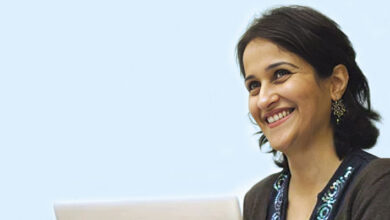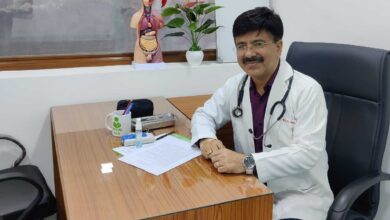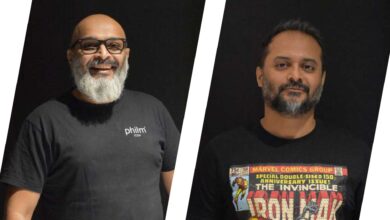Education: Today and Tomorrow
Dr. Lakshmi Kumar Founder Director, The Orchid School Program Coordinator, Sweden India Project
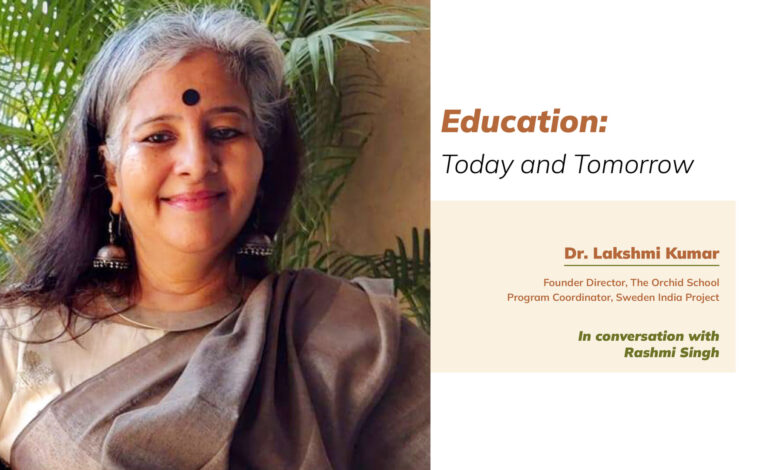
Tell us something about your school’s tagline, “Locally rooted globally competent education” and your school’s vision.
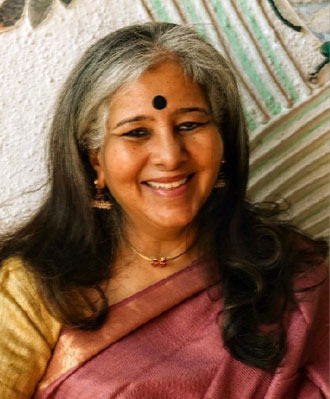 Taking inspiration from trees that have deeper roots, bigger and sturdy trunk, and bigger branches that houses birds and animals, I felt that to be able to spread my wings, I need to be deeply rooted in my context. The context is about knowing my culture, history, faith traditions, aesthetics of my land, role models, governance, traditions, customs, ethos, and values. Knowing and respecting this helps me appreciate the world around me. This depth helps me build the breadth. When I am comfortable and celebrate my context, I learn to value and appreciate others. This builds self-esteem and self-respect. This shows in the way I treat people from other cultures. We often hear that our students have traversed around the world but not visited Tulsibaug or understand the local traditions like Warkari which is the Sant Tradition/ Bhakti Movement of Maharashtra. I believe that education must embed in the local context and build the circle to the global context.
Taking inspiration from trees that have deeper roots, bigger and sturdy trunk, and bigger branches that houses birds and animals, I felt that to be able to spread my wings, I need to be deeply rooted in my context. The context is about knowing my culture, history, faith traditions, aesthetics of my land, role models, governance, traditions, customs, ethos, and values. Knowing and respecting this helps me appreciate the world around me. This depth helps me build the breadth. When I am comfortable and celebrate my context, I learn to value and appreciate others. This builds self-esteem and self-respect. This shows in the way I treat people from other cultures. We often hear that our students have traversed around the world but not visited Tulsibaug or understand the local traditions like Warkari which is the Sant Tradition/ Bhakti Movement of Maharashtra. I believe that education must embed in the local context and build the circle to the global context.
What made you choose the education sector as your profession?
I am a trained social worker specialising in medical and psychiatric social work. My initial days of work at a child guidance clinic revealed that if we want to prevent mental health issues and save our kids from becoming broken adults, school is the best place to begin. Thus, my journey began in 1984 as a school counsellor. I realised that school systems must be built around to serve the interests of the children and this must go hand in hand with educational goals. The social-emotional well-being was the mantra of my time and prevention and promotion of positive mental health was the focus. Enabling and empowering teachers so they are sensitised to the needs of the growing child, providing insights for understanding children with learning disabilities, supporting parents and families that are going through difficult times and working with whole school wellness was what I began with. I have completed a full circle! Child’s well-being is ever so relevant and more so in the post-pandemic world. Schools can make or break a child. So with more conviction, I spearhead the school reforms, and reinvention to build systems, policies, programs and people around the child rather than another way.
What are the challenges one goes through in the education industry?
Two big ones in my viewpoint –
• Unlearning our ideas of what a school should be
• Resistance to change
These two in one sense are cause and effect. Thus the joke on us is that the whole world may change but our classrooms still can look like the ones we had in the 40s and 50s.
There is a general consensus that many countries are still lagging in the race to provide quality education. Amidst such circumstances, you are known for introducing many innovative ideas to raise the standard of education in your school. Tell us about that in detail.
Quality is about staying relevant and giving what our learners need to equip them so they can build their future. The fact that I (all adults) won’t be around to fix their world is humbling and frightening. But this realisation is not new. This is what we aspire to do in our parenting process. Schools can gather knowledge around and envision the world of tomorrow. This means that we are willing to let go of our notions of education, schooling, assessments, and all the rituals of the schools and reimagine them in terms of what our students need.
This means building a space for participation and having a say in what they want to learn and how they want to learn. This is about us pushing ourselves out of to comfort zone and thinking it from the learner’s point of view. This is empathy in action – an exercise of collective envisioning. The good news is that we as educators are not alone in this process. We have inputs from all stakeholders who have an interest in building a healthy futuristic society. We as schools have to open our doors and windows to let people walk in and we also need to take our classrooms beyond the four walls. We must accept that learning can happen from anywhere – beyond classrooms, textbooks, and facilitators. Thus begins the journey of relearning how to transact education for today and tomorrow. We may derive wisdom from the past, and insights from our experiences and experiments but we have to extrapolate it to the dynamic ever changing fast paced life of our students. As Kahlil Gibran says, “For their souls dwell in the house of tomorrow, which you cannot visit, not even in your dreams.”
My students are my biggest inspiration. They push me to a deeper search for the meaning of education. They urge to dive deep to look for pearls of answers to their “why” questions. They never let me grow “old”. They make me dream of a stronger and better tomorrow.
Who has been your inspiration?
My students are my biggest inspiration. They push me to a deeper search for the meaning of education. They urge to dive deep to look for pearls of answers to their “why” questions. They never let me grow “old”. They make me dream of a stronger and better tomorrow as I see passionate young people who want to question the inequities, lack of justice, gender narratives, caste oppression, imbalance in world power, hypocrisies of our governance and political systems, commitment to the environment and courage to question us. They give me hope – for a better tomorrow.
They truly are my inspiration.
According to you what are the reformations that can be brought into the current educational system?
This would require a research paper. NEP could be a good start. I believe we educators need the conviction and realisation that we need to change the ways of managing schools; we need to change ways of teaching-learning process; deescalate the importance of assessments and scores that are currently in practice; enrol and take all stakeholders along.
How does The Orchid School help school children become 10X more confident in the real world?
Provide opportunities, create exposure, allow dissent, and build a culture of debate and dialogue. The voices of students are important in decisions that concern them. Our students do come from real worlds – every morning they are transacting communication, and interacting with people around them, including families. So create space to accommodate their experiences before sermonising about how they should be in the real world. I sometimes wonder if schools have built an artificial wall; otherwise, why are we so focused on the subjects and leave our real subjects – our students?
Lastly, what is one important life lesson you would like to teach the kids of today?
You matter the most – to yourself first.
So don’t let anything interfere with self growth. This is not about being self-centric. Your body and mind are the vehicles for all your dreams so take care of them. Ask for help. Seek support. Grab opportunities to stay healthy. This is a gift given by life. Appreciate, acknowledge, and be grateful for you can breathe and be alive at this moment. Let this be the mantra for life.


